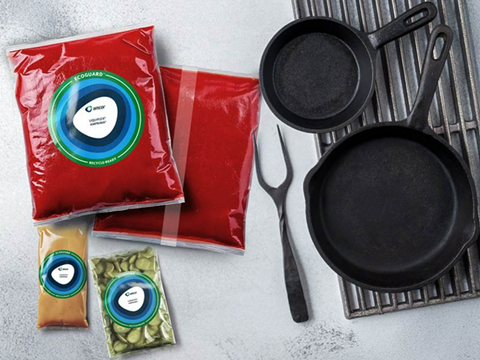
Amcor has launched its flexible Liquiflex AmPrima pouches in Europe for bulk foodservice products, said to offer a carbon footprint reduction of up to 79% and an 84% reduction in water consumption.
Seeking to be efficient for storage and transportation, Amcor says the pouches take up a fraction of the storage space before filling compared to traditional canned packaging, and pack tighter than cans when filled. The pouch can package bulk products including dressings, sauces, frozen vegetables and protein.
Compared to standard heavier packaging, the new pouches apparently offer a carbon footprint reduction of up to 79%, a 75% reduction in non-renewable energy and an 84% reduction in water consumption, calculated by Amcor’s ASSET life cycle assessment methodology certified by The Carbon Trust.
Amcor adds that the Liquiflex AmPrima pouches can incorporate food-contact compatible PCR content upon request, and the pouch can be fitted with a pump or spout dispenser to become a functional refill pack.
Engineered in line with the European Union’s Packaging and Packaging Waste Regulation (PPWR), Liquiflex AmPrima’s lightweight design and ‘recycle-readiness’ can potentially deliver EPR fees and plastic tax savings compared to heavier containers. This is Amcor’s estimation based on modulated EPR per main EU countries such as France, Germany and Spain, calculated using the Recyda platform. The pouches are designed to be recyclable in countries where polyethylene (PE) streams are in place.
The company recently revealed its paper-based stand-up pouch designed to be a ‘recycle-ready’ refill pack for dry beverage products like instant coffee. Claiming to offer a 73% reduction in carbon footprint and meet consumer demand for recyclable refills, the pack has been certified as kerbside recyclable in ‘several’ European countries by Cepi and Aticelca due to its 85% fibre content.
In January, Korozo Group partnered with Zertus UK & Ireland to create recyclable stand up pouches to introduce Baileys’ new Chocolate Nut Mix snack range to retail shelves. Korozo’s KoroRCY film was laminated to a PE layer with EVOH component to achieve the required barrier properties without compromising the pouch’s recyclability.
If you liked this story, you might also enjoy:
The ultimate guide to the Packaging and Packaging Waste Regulation in 2025
How are the top brands progressing on packaging sustainability?
Everything you need to know about global packaging sustainability regulation in 2025
The key to increasing the use of reusable packaging in supermarkets














No comments yet